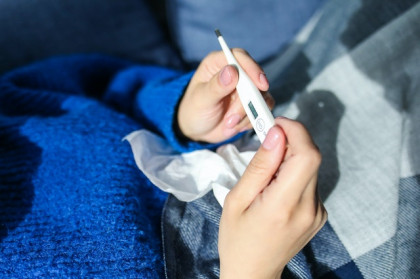Whats a High Fever for a 1 Year Old
What you need to know
- Fever is a normal way for your child's body to fight an infection, but in some cases it can be a sign of a more serious illness or infection.
- If your baby is three months or younger and has a fever, take them to the doctor.
- You can use a thermometer to check your child's temperature, but don't worry if you don't have a thermometer, there are other ways to check their temperature.
- Make your child comfortable and add or remove layers, depending on how they feel.
- Give medication if needed and always follow the label to make sure it's the right dose for your child's age, weight and illness.
Temperature
What's a normal body temperature?
A normal temperature is around 37 degrees Celsius, while a mild fever is a temperature higher than 38 degrees Celsius and a high fever is more than 39 degrees Celsius.
Using a thermometer
Digital thermometers give you a digital reading of your child's temperature and can be used on children of any age. Usually these thermometers are the cheapest option and any brand will work. If your child is under five years old, place the digital thermometer under their arm.
Ear thermometers can be used in older children, but not young babies, and are a bit more expensive than other types of thermometers. Read the instructions on how to take your child's temperature and remember to be gentle and just place the thermometer in the entrance of the ear canal - it doesn't have to be pushed right into the ear.
Infrared forehead thermometers measures your child's forehead skin temperature by pointing the thermometer at your child's forehead. Infrared thermometers may not be completely accurate and can be expensive.

Taking your child's temperature without a thermometer
Don't worry if you don't have a thermometer handy, yo u can still c heck your child's temperature . Slip two fingers down the back of their neck ( under their cl othes, in between the shoulder blades) and see if they feel hotter than normal.
Teething doesn't cause a fever. If your child is teething and has a fever, that may mean that your child is sick.
Fever in babies under three months
Young babies get fevers just like older children, but they' re not as good at fighting off infections . If your baby is under three months old and has a fever, take them to a doctor immediately.
If your baby feels colder than normal that's a worrying sign and means you should see your doctor urgently.
When to visit a doctor
U sually kids will recover from a fever quickly without problems, but sometimes a fever can be a sign of a more serious illness or infection.
Call PlunketLine or your doctor if your child has a fever and:
- is unusually s leepy or i rritable
- is not responding to you as normal
- has difficulty with their breathing , has noisy breathing or is breathing fast
- has a different cry or is crying more
- refus es to drink or is drinking less than normal
- has fewer wet nappies or is passing less wee than normal
- vomits and/or has diarrhoea
- has a non-blanching rash (a rash that doesn't fade when pressed with, and viewed through, a glass)
- avoids lights
- complains, or appears to have, a sore head or neck.
Treatment
Here are some tips to help make your child comfortable when they have a fever:
- give them extra rest
- provide extra cuddles and comfort and let them be near you
- offer extra fluids
- undress them so they are wearing just a single layer
- make sure the r oom is n't too hot or too cold
- if your child feel s cold and wants to be covered, that's okay
- if your child is flushed and seems warm, remove a layer
- avoid cool ing your little one too quickly - a cool face cloth on their f orehead or neck may be soothing
If yo u're worried about your child — even if they don't have a fever — you can call PlunketLine anytime or take them to see a doctor.
Medication
Medications can be helpful if your child is miserable or in pain, but they may not be needed . A ssess your child's symptoms and how they're feeling to decide if they need medication.
If you decide to give medication to your child, make sure to:
- read and follow the label to check how much medicine to give and how often
- give the right dose
- make sure the medication has not expired
- talk to the pharmacist to make sure the medicine is the right one for your child's age, weight and problem.
Paracetamol and ibuprofen should be used selectively and with caution, particularly for children who are dehydrated.
Related topics
Whats a High Fever for a 1 Year Old
Source: https://www.plunket.org.nz/child-health-concerns-and-symptoms/coughs-colds-breathing-and-fevers/fever-high-temperature/